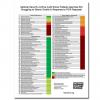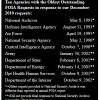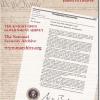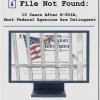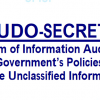FOIA Audits
Washington, D.C., March 15, 2024 - The National Archives and Records Administration (NARA) is requesting less funding for Fiscal Year (FY) 2025 than it received in FY 2024, threatening to worsen an already dire budget crisis for the steward of priceless U.S. government records.
Washington, D.C., March 9, 2023 – The public still cannot submit Freedom of Information Act (FOIA) requests to the CIA or other prominent agencies through the national FOIA portal, FOIA.gov, seven years after Congress required the building of a website that allows “the public to submit a request to any agency from a single website.” Three out of four federal agencies do not even mention FOIA.gov on their individual agency websites, with many funneling FOIA requesters through independent portals with varying degrees of functionality, leaving them unaware of a more simpl
U.S. National Archives 2025 Budget Request Threatens Mission Failure -
the 2024 update
Washington D.C., March 12, 2021 - The Defense Department finally replied to the National Security Archive’s September 2006 FOIA request early last year. After nearly 15 years of waiting, on January 24, 2020, the OSD/JS FOIA Office wrote:
“This pertains to your enclosed Freedom of Information Act request, which you submitted on September 26, 2006. We received your request on the same day and… regret the delay in completing your request.
Update
Washington, D.C. October 27, 2020 – Nearly 60 million Americans have already cast their ballots in the upcoming presidential election. While transparency and accurate information are critical as voters go to the polls, secrecy surrounding the government's handling of the novel coronavirus pandemic and disinformation campaigns are muddying the waters, not providing clarity.
Washington, D.C. March 8, 2019 – Five federal agencies have FOIA requests more than a decade old and one, the National Archives and Records Administration, has a FOIA request more than 25 years old, this according to a National Security Archive Audit released today to mark the beginning of Sunshine Week. The survey also found there is a correlation between agencies with the oldest FOIA requests and those with the largest FOIA backlogs.
Washington, DC, March 8, 2018 – Two out of five federal agencies claimed that they were either unable or not required to respond to a targeted Freedom of Information Act (FOIA) request for agency emails submitted by the National Security Archive.
Washington, DC, March 11, 2017 – Three out of five of all federal agencies are flouting the new law that improved the Freedom of Information Act (FOIA) and required them to update their FOIA regulations, according to the new National Security Archive FOIA Audit released today to celebrate Sunshine Week.
The Defense Intelligence Agency (DIA), the Department of the Treasury's Comptroller, and the Nuclear Regulatory Commission (NRC) are among a handful of agencies that have already admitted they will not meet the December 31, 2016, deadline for electronic management of official government email – like Hillary Clinton's – in their mandatory, annual self-assessment report to the National Archives and Records Administration (NARA).
In the News
Happy Sunshine Week: National Security Archive names E-Delinquents in 2015 E-FOIA Audit By Ms. Smith, Network World, March 17, 2015
Sunshine Week Column: Posting FOIA releases online saves agencies time and money By Lauren Harper, The Sentinel, March 15, 2015
Transparency Advocates Launch Sunshine Week with Mixed Reviews for Obama By Charles S. Clark, Government Executive, March 16, 2015
Federal Agencies Get Poor Marks on Sunshine Week Scorecards By CJ Ciaramella, The Washington Free Beacon, March 16, 2015
IN THE NEWS
Obama Administration Official Whitewashes Truth About FOIA By Jason Leopold, Freedom of the Press Foundation, March 17, 2014
Sunshine Week: Transparency issues persist with Obama administration By Josh Hicks, Washington Post, March 17, 2014
US Cites Security More to Censor, Deny Records By Ted Bridis and Jack Gillum, AP, March 16, 2014
Open Government and Freedom of Information: Reinvigorating the Freedom of Information Act for the Digital Age Senate Judiciary Committee Hearing, March 11, 2014
IN THE NEWS Agencies lag on transparency, report says By Josh Hicks, The Washington Post, December 4, 2012 Federal Agencies Are Failing to Uphold Obama's Stated Commitment to Transparency By Rebecca J.
IN THE NEWS
Updated December 6, 2012
Agencies lag on transparency, report says By Josh Hicks, The Washington Post, December 4, 2012
Federal Agencies Are Failing to Uphold Obama's Stated Commitment to Transparency By Rebecca J. Rosen, The Atlantic, December 5, 2012
TexMessage: Cornyn chides Obama administration for failing to meet transparency standards of his 2007 law By Jana Kasperkevic, Houston Chronicle, December 5, 2012
Obama's FOIA lag draws fire from left and right By Dave Boyer, The Washington Times, December 4, 2012
Washington, D.C., July 4, 2011 - Forty-five years after President Johnson signed the U.S. Freedom of Information Act into law in 1966, federal agency backlogs of FOIA requests are growing, with the oldest requests at eight agencies dating back over a decade and the single oldest request now 20 years old, according to the Knight Open Government Survey by the National Security Archive at George Washington University (www.nsarchive.org).
Washington, D.C., March 14, 2011 - The Obama administration is only about halfway toward its promise of improving Freedom of Information responsiveness among federal agencies, according to the new Knight Open Government Survey by the National Security Archive, released today for Sunshine Week at www.nsarchive.org.
Washington, DC, March 15, 2010 - Despite President Barack Obama's and Attorney General Eric Holder's 2009 memoranda calling for reform in government agencies' administration of the Freedom of Information Act (FOIA), the latest government-wide FOIA Audit released today by the National Security Archive at George Washington University found: Ancient requests--as old as 18 years--still persist in the FOIA system. A minority of agencies have responded to the Obama and Holder Memos with concrete changes in their FOIA practices.
Washington, D.C., March 16, 2008 - President Bush’s executive order for a “citizen-centered” and “results-oriented” Freedom of Information system did improve customer service at federal agencies, but has failed to make consistent progress on backlogs and has not significantly improved compliance with electronic FOIA requirements, according to the Knight Open Government Survey released today by the National Security Archive at George Washington University (www.nsarchive.org).
Washington, D.C., July 2, 2007 - The oldest Freedom of Information Act (FOIA) requests still pending in the federal government were first filed two decades ago, during the Reagan presidency, according to the Knight Open Government Survey released today by the National Security Archive at George Washington University. "Forty years after the law went into effect, we're seeing twenty years of delay," said Tom Blanton, the Archive's director, noting the July 4, 1967 implementation date for FOIA.
Washington D.C., 12 March 2007 - Ten years after Congress enacted the Electronic Freedom of Information Act Amendments (E-FOIA), only one in five federal agencies actually complies with the law, according to a new survey released today during Sunshine Week by the National Security Archive. Passed in 1996 and effective in 1997, E-FOIA ordered federal agencies to post key records online, provide citizens with detailed guidance on making information requests, and use new information technology to publish information proactively.
Washington D.C., March 14, 2006 - The first-ever government-wide audit of the ways that federal agencies mark and protect information that is unclassified but sensitive for security reasons has found 28 different and uncoordinated policies, none of which include effective oversight or monitoring of how many records are marked and withheld, by whom, or for how long.
In an effort to identify the oldest unanswered Freedom of Information Act (FOIA) requests in the federal government, the National Security Archive used the FOIA itself to ask more than 60 federal agencies for copies of their ten oldest pending FOIA requests. The results are astonishing-requests as old as 17 years remain unanswered, some agencies are unable even to identify their oldest requests, and agency backlogs are significantly more chronic and extensive than the agencies' annual reports to Congress indicate.
Washington D.C., November 17, 2003 - The oldest Freedom of Information requests that are still pending in the U.S. government date back to the late 1980s, before the collapse of the Soviet Union, according to the Freedom of Information Act Audit released today by George Washington University's National Security Archive. The oldest still-pending request is a 1987 inquiry from San Francisco Chronicle reporter Seth Rosenfeld on FBI activities at the University of California at Berkeley.
WASHINGTON, D.C., 14 MARCH 2003 - The National Security Archive at George Washington University today released results from the first-ever government-wide audit of federal responses to Freedom of Information Act (FOIA) requests. The audit shows dramatic variations in agency reactions to the restrictive FOIA guidance issued by Attorney General John Ashcroft in October 2001. Some agencies concluded the Ashcroft memo represented a "drastic" and "fundamental" change; others saw no change or said "Yeah. OK" when asked about impact.






